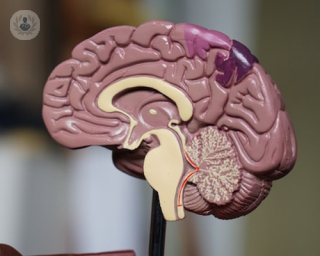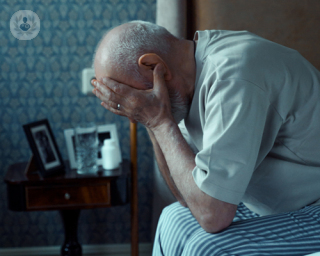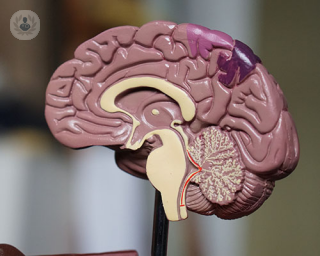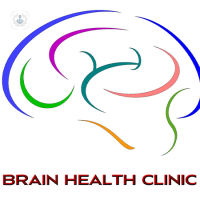Traumatic brain injury
Dr Daniel Ghossain - Psychology
Created on: 01-16-2013
Updated on: 07-31-2023
Edited by: Carlota Pano
What is traumatic brain injury?
Traumatic brain injury (TBI), or intracranial injury, is when a head injury causes damage to the brain. This may be caused by any sort of bump, blow, or jolt, and commonly results from vehicle collisions, falls, or violent incidents. While the term “head injury” is a broad term that can include damage to the scalp or skull, the term “traumatic brain injury” specifically refers to damage to the brain.
Brain injuries are and should always be taken seriously, and it is advisable to go to the hospital if you have suffered any kind of blow to the head, particularly if you feel ill or experience symptoms of traumatic brain injury. The worst brain injuries can result in permanent brain damage, or even be fatal.
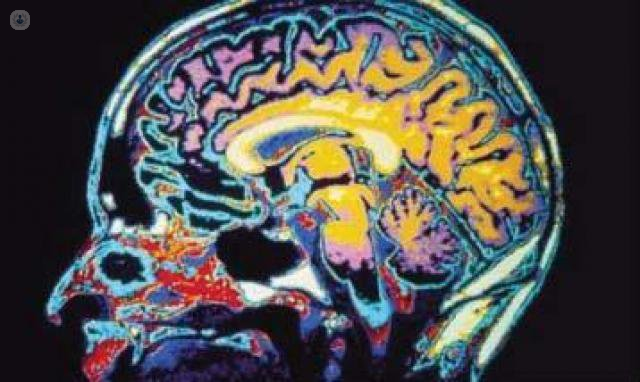
What are the symptoms of a traumatic brain injury?
The mildest type of traumatic brain injury is a concussion. While these are not usually serious, it is still a good idea to be checked out at a hospital, and perhaps even monitored overnight.
Symptoms include:
- headache
- neck pain
- ringing in the ears
- dizziness
- tiredness
- temporary trouble remembering things or concentrating
More severe intracranial injuries can cause the same symptoms, plus other more serious ones:
- nausea
- vomiting
- seizures or convulsions
- slurred speech
- a headache that does not go away, or even gets worse
- dilated pupils or pupils with unequal levels of dilation (unequal size)
- weakness/numbness in the limbs
In children too young to communicate what is wrong, you should look out for symptoms such as:
- continual crying/inability to be consoled
- irritability
- change in sleeping habits
- change in eating habits
- change in attention span
- loss of interest in their favourite games or toys
Complications of traumatic brain injury
Severe complications can occur immediately after traumatic brain injury, and patients can slip into comas or enter vegetative states. There may also be nerve damage or fluid build-up in the brain.
Patients recovering from a traumatic brain injury may experience long-term effects on their intellectual and communicative skills, including memory, judgement, concentration, ability to learn, ability to understand speech or writing, their own ability to speak or write, or ability to notice or understand the nuances in conversation.
What can cause a traumatic brain injury?
The most common causes are violence, sports, falls, and vehicle collisions. Motorbike accidents carry a high risk of traumatic brain injury. Domestic violence and child abuse have been reported as causing traumatic brain injuries, as have work-related accidents. Traumatic brain injury is the leading cause of death and disability in war zones, due to injuries caused by firearms and explosions.
In younger children, the most common cause of traumatic brain injury is falling over, while in older children falls and traffic accidents are both leading causes.
How can TBI be prevented?
Head injuries can often be avoided by using safety equipment and common sense. Use seatbelts in vehicles that have them, don’t drink and drive, and wear a helmet when cycling, skateboarding, or doing similar activities. Use protective headgear when engaging in contact sports, baseball, or other sports that carry a risk of head injury.
Older adults can reduce the risk of falling by having handrails installed in the bathroom and on both sides of the stairs, getting regular exercise, and vision check-ups.
To prevent head injuries in children, keep them away from playing on high places, like balconies or fire escapes, install safety gates around the house (for younger children), and keep stairs free of clutter.
What is the treatment?
A CT scan or an MRI may be used to scan the brain to assess the situation.
Mild traumatic brain injuries, such as concussion, usually require no treatment, but the patient requires close monitoring in case of secondary injury or complications. Over-the-counter pain medication may help any headaches.
In the case of serious traumatic brain injuries, emergency care focuses on maintaining blood pressure, preventing further injury, and ensuring the patient has adequate blood and oxygen supply. Medication, such as diuretics and anti-seizure drugs, may be needed to prevent or limit secondary damage immediately after an injury. Sometimes, emergency surgery is required – this could involve removing clotted blood (hematomas) that are putting pressure on the brain, repairing fractures in the skull, removing pieces of skull from the brain, or opening a window in the skull to reduce pressure on the brain.
Significant brain injuries may need rehabilitation in the long-term, as patients may need help recovering their mental faculties – some may even need to relearn how to walk and talk.
There are a number of support groups for people recovering from a traumatic brain injury, and many sources of help and advice to aid recovery.

